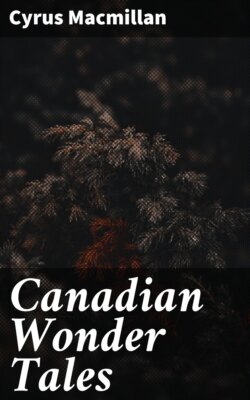Читать книгу Canadian Wonder Tales - Cyrus Macmillan - Страница 3
На сайте Литреса книга снята с продажи.
FOREWORD
ОглавлениеTable of Contents
This is the book of a soldier-student. Captain Macmillan interrupted his teaching work in Montreal to go overseas with one of our McGill Batteries, and from "Somewhere in France" he has asked me to stand sponsor for his volume.
The author's method resembles that followed by the brothers Grimm a century ago. He has taken down from the lips of living people, pretty much as they were given to him, a series of stories which obviously contain many elements that have been handed down by oral tradition from some far-off past. They are mostly animal stories, with all the usual features of magic and transformation, articulate speech on the part of the animals, and interchange of more or less kindly offices between man and beast.
The result is a collection of fables which—especially as illustrated by an eminent artist—will prove a very acceptable Christmas book for children, and will give their elders also some food for reflection. Not that there is, so far as I have been able to discover, any moral about some at least of the tales. They are not "stories with a purpose." But they suggest to the adult reader the essential identity of many of the methods by which in a more or less remote antiquity the human race expressed itself in various parts of the world.
That has now become a matter of scientific study. The floating material of popular tradition at different times and in different places has been spread out, as it were, on a dissecting-table by our Folk-lore Societies, and the thoughts and beliefs, customs and superstitions therein preserved have been studied from the comparative point of view for the light they throw on the primitive development of the human mind. Those of us who read the Journal of American Folk-lore, or the papers on Indian mythology recently contributed by C. M. Barbeau to the anthropological series issued by the Geological Survey of Canada, have many sources at hand with which Mr. Macmillan's folk-tales may be profitably compared. Some of the stories—those, for instance, that refer to Shrove Tuesday on the one hand, and packed sardines on the other—are obviously of no earlier date than "the days when Canada was owned by the French." But many of them go back to "long before the white men came to Canada." That these are folk-tales of the universal type is evidenced by the primitive traditions which they embody. In all such stories striking resemblances occur, whether they are the records of Algonquins or Zulus, Hottentots or Australian Bushmen. To say nothing of charms and incantations, magic coats and magic wands, ogres and giants, mermen and mermaidens, supernatural creatures and speaking beasts, evil spirits in disguise, there are the standing-dishes of all such folk-tales—the strong man and his adventures, the bride carried off by the youthful hero and pursued by her father, the promise that the bride shall be given to anyone who shall accomplish some difficult task, with death as the penalty of failure. These and such-like features are all examples of primitive methods of self-expression, and represent, in the case before us, the Indian's elemental ideas of the universe around him and his relation to it.
Thus Mr. Macmillan's "Wonder Tales," while serving for the pleasure and delight of children, have their points of contact with what we must take to be the background of prehistoric culture on the continent of America. But the children will read and enjoy them for their own sake, and unhampered by any such applications of the comparative method. They will learn in this book the answers to such conundrums as the following—Why Frog croaks, Why Bear eats fish, Why Bunny has a short tail and long hind-legs and a split upper-lip, Why Partridge makes a drumming noise, Why Mosquitoes sting, Why Aspen leaves tremble, What Woodpecker and Bluejay were before they were changed into birds, Why the Moon usually travels alone in the forest. And, if they find anything unsatisfactory about the answers herein recorded, they will have the opportunity of exercising their imaginations to better purpose than was done by those who gave these answers in the days when the world was young!
W. PETERSON
October, 1917.
